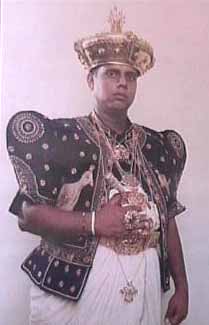
|
||
|
| ||
![[Kataragama Devotees Trust banner. For information about the Kataragame Devotees Trust of Sri Lanka go to the Kataragama Kaele Kendra home page.]](../pix/kdtlogo.gif)
Kataragama 2003 Interview Series: Basnayake NilameRuhunu Kataragama Maha Devale Basnayake
Nilame Pradeep Nilanga Dhala Bandara is interviewed by Patrick Harrigan
|
 |
| Ruhunu Kataragama Maha Devale Basnayake Nilame Pradeep Nilanga Dhala Bandara |
Q: What do you believe should be the aim of every Basnayake Nilame, and what do you specifically aim to achieve during your term in office as Kataragama Basnayake Nilame?
BN: In my view, the aim of every Basnayake Nilame should be to maintain the interests and welfare of the devotees, perform established rituals of the Devalaya properly, and develop the physical infrastructure while preserving its ancient traditions.
My specific aim as Ruhunu Kataragama Maha Devalaya Basnayake Nilame is to make the general public of the country aware of the spiritual and historical significance of the Devalaya, particularly in this era of ethnic conflict. Tamil Hindus, Sinhala Buddhists and Muslims have been visiting this Devalaya in harmony for centuries. It should remain that way.
Q: Some people have described Kataragama as a spiritual university. Others call it a natural zone of peace. What is your understanding of Kataragama and how do you think Kataragama's potential value to society can best be appreciated and developed?
BN: Both views are correct and agreeable. Currently the important thing is peace and I would emphasis more on this. Kataragama is an important pilgrimage destination for people of most religions in the country, at least during the festival season.
I believe that Kataragama's political significance has been continually underestimated. This sacred place, its festivals and traditions, and the faith of so many people in the Kataragama God should be recognised as a natural rallying point for national reconciliation and unity.
Q: Do you believe that Kataragama's age old reputation as a sylvan shrine can be restored? Can the forest hermitages of Deviyange Kaele come back to life? Would Ruhunu Kataragama Maha Devale have a role to play?
BN: Of course, Kataragama can be restored as a centre of spiritual life. But the change will have to be generated among the public and promoted by the State as a policy. Kataragama Devalaya is certainly one of the most natural places from which this restoration could be generated.
Q: Similarly, what can be done to protect Deviyange Kele so it does not vanish? How can we protect the forest environment from tree-felling and piece-meal destruction?
BN: Tree planting and tree felling in the forest need to be done in a well regulated, planned and monitored fashion. Perhaps, alternative employment could be found for those often involved in illicit timber felling.
Q: Along similar lines, how can the Menik Ganga waters best be utilized for the greatest benefit to the region's people, without drying up the sacred river?
BN: Water management need special attention since agriculture in this region can not depend upon rain water alone. The Menik Ganga within the sacred area must not be over-exploited. Alternative sources of water for the benefit of Kataragama devotees and also for agricultural purposes of the area need to be identified and developed.
Q: Do you feel that there may be a contradiction between seeking to urbanise Kataragama and, at the same time, declaring it as a sacred area? How can we encourage more and more visitors to come to Kataragama and, at the same time, preserve the sanctity and traditions of the ancient shrine?
BN: The town of Kataragama can be urbanized, obviously. But everyone who enters the sacred shrine area needs to follow the disciplinary codes strictly according to our traditions.
There should be a better mechanism to monitor the devotees and those who enter the Devalaya premises, so that they enter properly attired for purposes of worship. The sanctity of the ancient shrine must be preserved, and it is every visitor's responsibility to respect Kataragama's traditions.